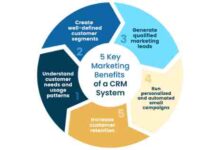What is a CRM in Real Estate? Cheat Sheet for Realtors
Customer Relationship Management (CRM) is a crucial aspect of modern real estate practices. In a highly competitive industry like real estate, maintaining strong relationships with clients and leads can make all the difference. A CRM system serves as a centralized hub where realtors can organize and manage all interactions with clients and potential clients, streamline communication, and track important tasks and deadlines.
So, what exactly does a CRM in real estate entail? Essentially, it’s a software solution designed specifically for real estate professionals to keep track of customer data, including contact information, preferences, past interactions, and upcoming appointments. This information is invaluable for tailoring communication and providing personalized service, which can significantly enhance client satisfaction and retention.
The benefits of using a CRM in real estate are manifold. Firstly, it allows realtors to stay organized and efficient by providing a single platform to manage all client-related activities. This means no more juggling between multiple spreadsheets, email threads, and sticky notes – everything is consolidated in one place.
Additionally, a CRM enables real estate agents to nurture leads more effectively. By tracking interactions and analyzing data, agents can identify promising leads and tailor their communication strategies accordingly. This targeted approach increases the likelihood of converting leads into clients, ultimately driving sales and revenue.
Moreover, a CRM facilitates better communication and collaboration within real estate teams. Agents can easily share information, assign tasks, and track progress, ensuring that everyone is on the same page and nothing falls through the cracks.
Now, you might be wondering: with so many CRM options available, which one is the best for realtors? While the answer depends on individual needs and preferences, some popular choices include HubSpot for scalability, Salesforce for integrated real estate management, Zendesk for on-the-go accessibility, Pipedrive for cost-effectiveness, Follow Up Boss for established realtors, and LionDesk for newcomers to the industry.
Ultimately, the objective of a CRM in real estate is to streamline operations, improve client relationships, and drive business growth. By investing in a reliable CRM system and leveraging its features effectively, real estate professionals can elevate their productivity, enhance their service offerings, and achieve greater success in a competitive market.
Furthermore Continue
Furthermore, the primary objective of a CRM in real estate is to provide realtors with the tools they need to deliver exceptional service to their clients. This includes:
Efficient Sales Process Management: A CRM helps real estate agents streamline their sales process by providing a clear overview of all leads and clients in various stages of the buying or selling journey. This allows agents to prioritize tasks, follow up promptly, and ensure that no opportunity is missed.
Personalized Client Service: By centralizing client information and communication history, a CRM enables realtors to deliver personalized service tailored to each client’s preferences and needs. Whether it’s remembering a client’s preferred communication channel or their specific property requirements, a CRM ensures that every interaction feels personalized and meaningful.
Time Savings: With automated features such as email templates, task reminders, and lead scoring, a CRM helps real estate agents save time on repetitive administrative tasks. This frees up more time for client-facing activities such as property viewings, negotiations, and relationship-building.
Data Analysis and Insights: Most modern CRMs come with robust reporting and analytics capabilities that allow realtors to track key metrics such as conversion rates, lead sources, and sales performance. By analyzing this data, agents can identify trends, uncover areas for improvement, and make data-driven decisions to optimize their business strategies.
Improved Communication and Collaboration: A CRM serves as a central hub for communication within real estate teams, enabling seamless collaboration and knowledge sharing. Whether it’s assigning tasks to colleagues, sharing important updates about a client, or collaborating on a marketing campaign, a CRM ensures that everyone is aligned and working towards common goals.
In summary, a CRM in real estate is not just a software tool—it’s a strategic asset that empowers realtors to deliver outstanding service, streamline operations, and drive business growth. By leveraging the capabilities of a CRM effectively, real estate professionals can stay ahead in a competitive market and build lasting relationships with their clients.

